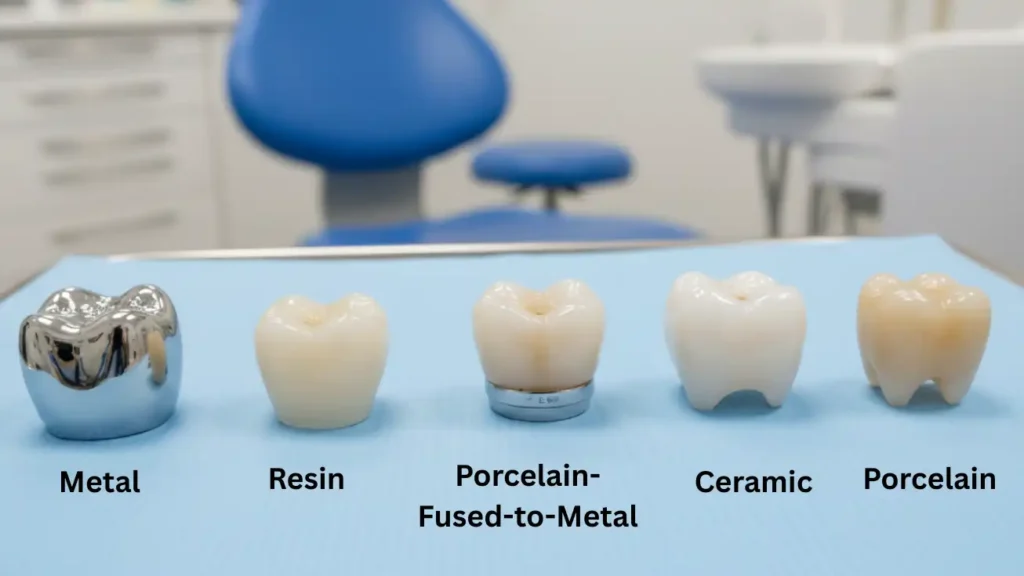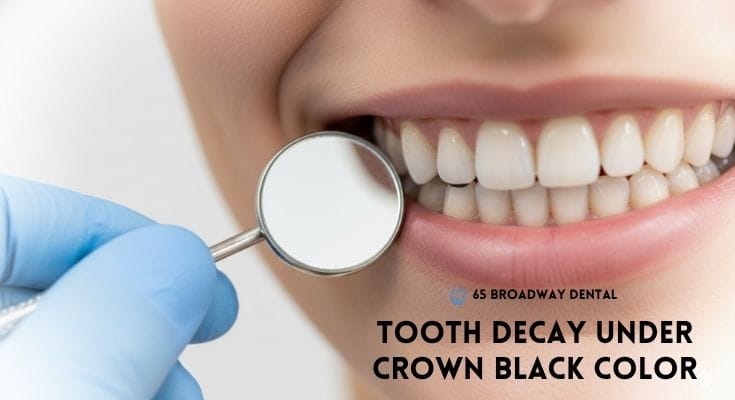Comparing the Top 5 Types of Dental Crowns
Dental crown technology has advanced, providing people with more options. This gives them the freedom to choose a crown material according to their precise needs.
Whether you require strength, longevity, or appeal, there is the perfect dental crown option. There are various types of dental crowns, providing better care for dental patients. Dental crown procedures are placed under the restorative dental category. Unlike dental implants, placing a dental crown doesn’t require surgery or pain. Your tooth is filed down, and an artificial tooth (crown) is fitted over it.
This blog explores and compares the various types of dental crowns to help you make the best choice for your teeth.
What are the Different Types of Dental Crowns?
Dental crowns are divided based on the type of material they are made from. They range from metals to synthetic man-made materials like resin.

Resin Crowns
Unlike traditional crowns that have a tooth-like appearance, a metal crown is completely made of metal. These are also hardy materials that offer exceptional durability for a long time. Surprisingly, they aren’t as expensive as some of the other crown options.
Even within the category of metal crowns, variations exist based on the metal used. While stainless steel and gold are the most well-known, metals like cobalt and nickel are also used.
Stainless Steel Crowns
These are mostly used to make ready-to-insert metal crowns. Such ready-to-use crowns are meant for children who don’t require specialized shaping. They come in pre-made sizes and are much more resistant. Although strong, they are only needed until the next set of permanent teeth appears.
Cast Metal Crowns
Cast metal crowns are crowns made from a mixture of metals. These consist of all metals and are generally less experienced than pure-metal crowns. Unlike stainless steel, a cast metal mixture is suitable for adults because it’s shapable. This enables dentists to take patients' tooth measurements for a better fit.
Gold Crowns
These crowns are the most expensive type of metal dental crowns. Forged from gold, these caps have the best durability. However, they won’t fit in naturally with your other teeth. Gold crowns and other cast metal crowns can be ideal for out-of-sight positions. This includes premolars and molars, which have vital functions.
Resin Crowns
Compared to other types of dental crowns, resin crowns are the least strong. So it makes sense why resin is used for temporary crowns.
Even with a short-lived quality, they can last 3 to 5 years. Because they aren’t as strong, resin crowns aren’t as expensive either.
Porcelain-Fused-to-Metal (PFM) Crowns
Porcelain-fused-to-metal crowns are ideal for patients who need the strength and appeal of both components. Since the porcelain is the outer/top part of the crown, it matches natural teeth.
This customization of the porcelain enables dentists to match crowns to teeth perfectly. The crowns can be specially shaped and colored to suit surrounding teeth. Like metal crowns, these are long-lasting dental appliances.
Ceramic Crowns
These may be the most expensive type of dental crowns, but for good reason. They are long-lasting and can look good, even when surrounded by natural teeth. These materials are also advisable if the patient has a metal allergy.
Dental labs create and test these crowns to ensure quality and fit alignment.
Zirconia Crowns
Zirconia, or Zirconium Dioxide, is a compound that is most popular for making dental crowns. It’s one of the most easily accessible materials among all the types of dental crowns. This material offers good strength, but not as much as metal crowns do. The point of difference is that they can match the appearance of natural teeth. Zirconia is highly durable and takes heavier forces than other ceramics. Its other qualities are that it's safe for people with allergies and is gentle on other teeth.
Lithium Disilicate Crowns
This material is less common than the others, because it's still new. It’s an all-ceramic crown made from a light and thin material known as lithium disilicate. In cosmetic dentistry, these crowns are known as E-Max. Other features of E-Max crowns are their appealing look and strength. Due to these qualities, they are suitable for back and front teeth.
Porcelain Crowns
This material provides the most natural-looking dental crowns. Due to its qualities and appearance, porcelain is the most popular material for dental crowns. These types of dental crowns don’t consist of other materials.
Pure porcelain mimics the look of real teeth, including shape, size, and texture. This also makes it the number one choice for front-tooth restorations. Their safe composition means there is little to no possibility of being allergic to them.
What are Temporary Crowns?
Temporary crowns are short-lived crowns with a specific purpose. Dentists place them over teeth that require a crown. This gives dentists time to send the measurements to a professional lab for development.
In the meantime, a temporary crown will ensure the patient continues without any inconvenience. Sometimes, dentists may recommend other treatments, such as Zygomatic dental implants, if your teeth can’t be saved with crowns.
It also ensures the tooth doesn’t suffer any damage or size change. When the permanent crown arrives, the dentist removes the temporary one and fits it in.
Comparing Dental Crown Materials / Dental Crown Material Comparison
Is your tooth decay worsening after 60, or are you developing cavities in your 30s? Either way, knowing your options is vital to finding an effective dental solution.
| Feature | Metal | Resin | Porcelain-Fused-Metal | Ceramic | Porcelain |
|---|---|---|---|---|---|
| Appearance | Metallic and shiny | Tooth-colored but not natural-looking | Tooth-colored exterior, metal interior | Most realistic, tooth-like look | Glossy and natural life-like appearance |
| Strength | Very strong & long-lasting | Weak | Very strong and durable | Strong but has weaknesses | Strong but not as long-lasting as metal |
| Allergy Potential | Yes (especially Nickel crowns) | Very low | Yes (if allergic to metal alloys) | Rarely | Rarely |
| Lifespan | 10–20 years (or more) | 3–5 years | 10–15 years | 10–15 years | 8–15 years |
| Ideal Use | Back molars | Temporary crowns | Front or back teeth | Front teeth / metal allergy cases | Front teeth |
| Cost | High | Low | Moderate | High | High |
Disadvantages & Advantages of Dental Crowns
Dental crowns have been a revolutionary addition to dentistry. Proper cleaning and fitting are necessary for crowns to be effective. They have been constantly evolving, but that doesn’t mean that they are flawless.
| Advantages of Dental Crowns | Disadvantages of Dental Crowns |
|---|---|
| Best solutions for decaying or damaged teeth. | Most often requires the removal of healthy tooth material. |
| Can last 10 to 15 years with proper care. | They can loosen or become damaged over time. |
| Protects teeth from wear and tear (erosion). | Can be expensive depending on material and procedure. |
| Helps restore normal tooth function. | Discomfort possible if the fit or material isn’t proper. |
| Customizable to match the color and shape of natural teeth. | Potential allergic reactions in rare cases. |
| Improves the appearance of worn or damaged teeth. | May trap bacteria if the crown fit is imperfect. |
Conclusion
How long do dental crowns last is one of the 50 most asked dental questions from the public. People want a long-lasting and reliable solution to decaying, broken, or worn-out teeth. Dental crowns are capable of lasting long; it’s a matter of the material you choose.
Metal crowns last the longest, although they lack the matching appearance. Ceramic crowns are the next best and possess exceptional durability and appearance qualities. At 65 Broadway Dental, we help you make the best choice for your teeth. This ensures you retain your smile without compromising on dental function.
Care at 65 Broadway Dental
At 65 Broadway Dental, we help you understand the different types of dental crowns. We explain how each crown works and what makes them different, using simple words. Our team helps you choose the option that fits your tooth, comfort, and smile needs.
FAQs
1. What type of crown lasts the longest?
The longest-lasting crowns are those made out of metal. This is the most resistant material from which dental crowns can be made.
2. Which crowns look most natural?
Ceramic and porcelain dental crowns look the most natural of all the other options. They naturally suit the size, color, and shape of human teeth.
3. What is the least expensive type of crown?
The least costly types of dental crowns are resin ones. This is because they aren’t as strong as the other materials. These qualities make it a suitable temporary solution to tooth decay or damage.
4. Can a tooth rot under a crown?
It’s not impossible for a tooth beneath a crown to rot. This happens because the crown is not securely fitted, allowing bacteria or food to get under it.
5. What are crown failure signs?
Some evident signs of crown failure are pain, sensitivity, changes in crown appearance, bite changes, or loose crowns. Any of these signs is concerning and will require a visit to the dentist.
6. What is the downside of Zirconia crowns?
A downside of Zirconia is that it can be difficult to adjust. Additionally, Zirconia crowns are so strong that they may cause the natural teeth they bite down on to wear down.

Dr. Alexander Heifitz (Author)
Dr. Alexander Heifitz is the founder of 65 Broadway Dental in NYC, where he combines advanced dental expertise with a patient-first approach. He specializes in cosmetic and restorative treatments such as dental implants, veneers, Invisalign, and smile makeovers, helping New Yorkers achieve both oral health and confidence.
Booking An Appointment
Looking for a reliable dentist in Downtown NYC? Whether you need a routine cleaning, urgent care, or a full smile transformation — we’ve got you covered. We accept most PPO insurance plans and offer flexible scheduling.
+1 (212) 430-3888
Call for appointment
Walk-ins Welcome / Same-Day Appointments Available

Related Blogs

How Can You Help a Toothache? Simple Fixes, and When to See a Dentist
Learn quick, safe ways to ease a toothache at home, what to avoid, and the signs that mean it’s time to visit a dentist immediately.
Read More
Tooth Decay Under Crown Black Color (How I Fixed It)
Tooth decay under crown black color explained, what causes it, how I fixed it, and when to see a dentist before the damage gets worse.
Read More